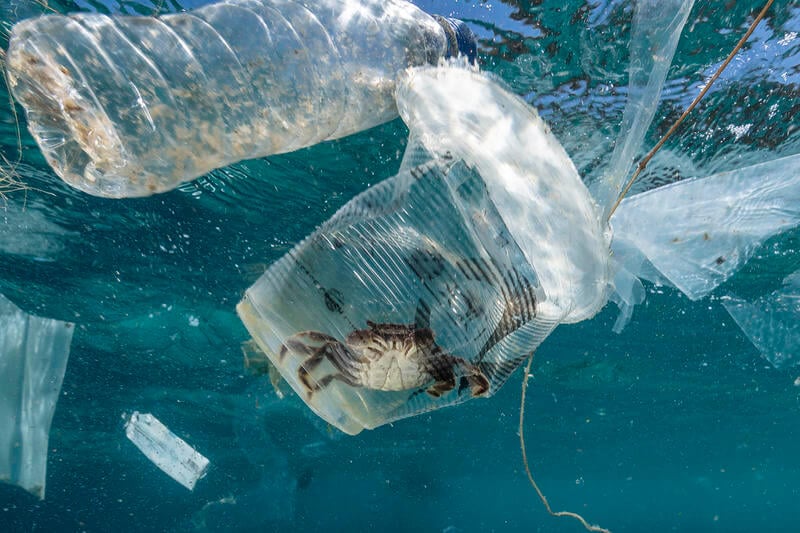Plastic Free July is underway, and there’s no better time to review some of the key actions that can help accelerate the transition to a plastic-free future.
Did you know that if we could continue business as usual, plastic production could triple by 2050? Triple! But plastic production has already caused a global pollution disaster, We need to draw a line in the sand filled with microplastics. It’s time to end the plastic era! Scientific studies (and our own eyes) have shown that: Plastic is everywhere. It’s in our bodies, on the highest mountains, on remote lakes, on deserted islands, and in the air we breathe. I’m sitting on it right now as I write this blog. From our office chairs to our clothes, from stuffed animals to tea bags, from potted plants to granola bar wrappers, from personal care products to pens, the challenge of going plastic-free may be futile for most of us, but it’s definitely here. There are plenty of challenging plastic villains.
Environmental Defence, Animal Justice and concerned advocates rally outside the federal courthouse in Toronto to support stronger action on plastic pollution and call for #StopBigPlastic. Source: Environmental Defence
Big Plastic
Big Plastic, a group of petrochemical and plastics companies, is constantly up to no good in its bid to block government action to curb plastic pollution. In Canada, it has filed not one but two lawsuits against the federal government to try to stop a ban on single-use plastics, and it has waged a full-scale marketing campaign to spread the false narrative that plastic is better. Greenpeace has found that its lobbying has been intensified in conjunction with the Global Plastics Treaty negotiations and federal action plans. Meanwhile, it continues to threaten the health of people and the planet, most recently in the unceded Aamjiwnaang territory. An emergency has been triggered after Ineos Styrolution released benzene, a known carcinogen, into the community (again). It’s a 10/10 on the plastic villain scale.
Consumer Goods Brand
Fast-moving consumer goods companies (FMCG) such as Coca-Cola, Nestle, Unilever and many other popular brands. It has been identified as the world’s top plastic polluter by a global cleanup and brand audit.. Last year, Greenpeace UK exposed the contribution of the Unilever-owned Dove brand, particularly in the so-called Global South, to the plastic pollution crisis. Unilever sells 1,700 polluting single-use plastic pouches every second. Dove says it values ‘real beauty’, but there is no beauty in a brand that pollutes the planet and threatens the health of communities. More than 140,000 people have already written to Dove, pledging to be a force for good by stopping the sale of pouches by the end of 2025, phasing out all single-use plastics within 10 years, and championing these goals in the UN’s Global Plastics Pact. While Unilever and some other brands have made loose sustainability commitments, the real-world impact is still dire. 9.5 out of 10 on the plastic villain scale.
As part of the Reuse Revolution Global Refill Week action, Greenpeace Canada volunteers placed cards on supermarket shelves, demanding more products in unpackaged and bulk options, and in reusable packaging. Source: Greenpeace
supermarket
Back in January 2019, Greenpeace I started a petition We are calling on Canada’s largest supermarket chain to phase out single-use plastics and adopt reusable packaging and refillable delivery models to address its massive plastic footprint. Despite exposing its role in waste colonialism, a huge call for customers and the public to remove endless unnecessary plastics from their shopping carts, and even recent attempts by the federal government to pressure the retail giant to act quickly on plastic reduction, little has changed in the supermarket aisles. Recent Environmental Defense Report I found more than that In produce and baby food stores alone, 70% of products are packaged in plastic. While there is some hope for reuse, with Reusables.com partnering with retailers to offer options, plastic-free alternatives are extremely limited and still a long way from being available in every store and community. A 9 out of 10 on the plastic villain scale.
What you can do!
The list of plastic waste and environmental pollutants is incredibly long. While there are companies pushing for real reusable solutions, there are countless others that are stuck using plastic. Changing our broken plastic-dependent system is the path to a healthier, less polluted planet. And despite major forces at work trying to keep us locked into a take-make-dispose economy of extraction and exploitation, this movement is strong and growing around the world. As the call for change grows, we must take this call to: 1) the corporations that are responsible for creating the plastic pollution and waste crisis; and 2) governments who must take bold action to accelerate a just transition to a zero-waste, low-carbon reality.
- We urge Canada to support a strong global plastics treaty! We need a global solution to this global problem. Negotiations on a UN agreement to end plastic pollution are well underway, with the final meeting scheduled for later this year. The stakes are high, and the potential for positive change is even higher!
- Urges Canada to support reuse-based systems. Create a national recycling strategy!
- Join Ditch Dove! Until Dove eliminates single-use plastic bags, Dove’s customers should know that they are not supporting the harm caused by Dove’s bags.
- Spread the word to stop using bulky plastics! Learn more about how Greenpeace is joining forces with Ecojustice and others to continue Canada’s plastic ban, and show your support for a ban on single-use plastics by sharing this blog!

take action






